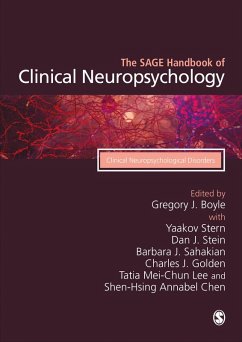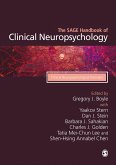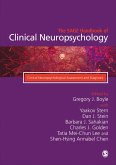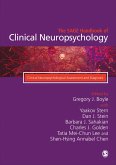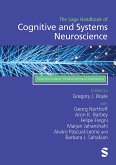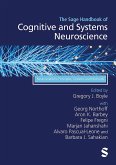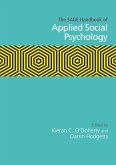The SAGE Handbook of Clinical Neuropsychology (eBook, ePUB)
Clinical Neuropsychological Disorders
Redaktion: Boyle, Gregory J.; Chen, Shen-Hsing Annabel; Lee, Tatia Mei-Chun; Golden, Charles J.; Sahakian, Barbara J.; Stein, Dan J.; Stern, Yaakov
93,95 €
93,95 €
inkl. MwSt.
Sofort per Download lieferbar

47 °P sammeln
93,95 €
Als Download kaufen

93,95 €
inkl. MwSt.
Sofort per Download lieferbar

47 °P sammeln
Jetzt verschenken
Alle Infos zum eBook verschenken
93,95 €
inkl. MwSt.
Sofort per Download lieferbar
Alle Infos zum eBook verschenken

47 °P sammeln
The SAGE Handbook of Clinical Neuropsychology (eBook, ePUB)
Clinical Neuropsychological Disorders
Redaktion: Boyle, Gregory J.; Chen, Shen-Hsing Annabel; Lee, Tatia Mei-Chun; Golden, Charles J.; Sahakian, Barbara J.; Stein, Dan J.; Stern, Yaakov
- Format: ePub
- Merkliste
- Auf die Merkliste
- Bewerten Bewerten
- Teilen
- Produkt teilen
- Produkterinnerung
- Produkterinnerung

Bitte loggen Sie sich zunächst in Ihr Kundenkonto ein oder registrieren Sie sich bei
bücher.de, um das eBook-Abo tolino select nutzen zu können.
Hier können Sie sich einloggen
Hier können Sie sich einloggen
Sie sind bereits eingeloggt. Klicken Sie auf 2. tolino select Abo, um fortzufahren.

Bitte loggen Sie sich zunächst in Ihr Kundenkonto ein oder registrieren Sie sich bei bücher.de, um das eBook-Abo tolino select nutzen zu können.
Clinical Neuropsychology is a vast and varied field that focuses on the treatment, assessment and diagnosis of a range of cognitive disorders through a study and understanding of neuroanatomy and the relationship between the brain and human behavior.
This handbook focuses on specific Neuropsychological disorders. It covers each of the classification systems involved before moving on to specific types of disorders from neurodevelopmental to neuropathological as well as brain injuries, trauma and neurodegenerative disorders.
This handbook not only provides an in-depth overview of these…mehr
- Geräte: eReader
- mit Kopierschutz
- eBook Hilfe
- Größe: 29.5MB
Andere Kunden interessierten sich auch für
![The SAGE Handbook of Clinical Neuropsychology (eBook, ePUB) The SAGE Handbook of Clinical Neuropsychology (eBook, ePUB)]() The SAGE Handbook of Clinical Neuropsychology (eBook, ePUB)93,95 €
The SAGE Handbook of Clinical Neuropsychology (eBook, ePUB)93,95 €![The SAGE Handbook of Clinical Neuropsychology (eBook, ePUB) The SAGE Handbook of Clinical Neuropsychology (eBook, ePUB)]() The SAGE Handbook of Clinical Neuropsychology (eBook, ePUB)93,95 €
The SAGE Handbook of Clinical Neuropsychology (eBook, ePUB)93,95 €![The SAGE Handbook of Clinical Neuropsychology (eBook, ePUB) The SAGE Handbook of Clinical Neuropsychology (eBook, ePUB)]() The SAGE Handbook of Clinical Neuropsychology (eBook, ePUB)93,95 €
The SAGE Handbook of Clinical Neuropsychology (eBook, ePUB)93,95 €![The Sage Handbook of Cognitive and Systems Neuroscience (eBook, ePUB) The Sage Handbook of Cognitive and Systems Neuroscience (eBook, ePUB)]() The Sage Handbook of Cognitive and Systems Neuroscience (eBook, ePUB)93,95 €
The Sage Handbook of Cognitive and Systems Neuroscience (eBook, ePUB)93,95 €![The Sage Handbook of Cognitive and Systems Neuroscience (eBook, ePUB) The Sage Handbook of Cognitive and Systems Neuroscience (eBook, ePUB)]() The Sage Handbook of Cognitive and Systems Neuroscience (eBook, ePUB)93,95 €
The Sage Handbook of Cognitive and Systems Neuroscience (eBook, ePUB)93,95 €![The Sage Handbook of Social Constructionist Practice (eBook, ePUB) The Sage Handbook of Social Constructionist Practice (eBook, ePUB)]() The Sage Handbook of Social Constructionist Practice (eBook, ePUB)100,95 €
The Sage Handbook of Social Constructionist Practice (eBook, ePUB)100,95 €![The SAGE Handbook of Applied Social Psychology (eBook, ePUB) The SAGE Handbook of Applied Social Psychology (eBook, ePUB)]() The SAGE Handbook of Applied Social Psychology (eBook, ePUB)100,95 €
The SAGE Handbook of Applied Social Psychology (eBook, ePUB)100,95 €-
-
-
Clinical Neuropsychology is a vast and varied field that focuses on the treatment, assessment and diagnosis of a range of cognitive disorders through a study and understanding of neuroanatomy and the relationship between the brain and human behavior.
This handbook focuses on specific Neuropsychological disorders. It covers each of the classification systems involved before moving on to specific types of disorders from neurodevelopmental to neuropathological as well as brain injuries, trauma and neurodegenerative disorders.
This handbook not only provides an in-depth overview of these Neuropsychological disorders, but also explores the history of the field as well its global challenges.
The handbook is an essential tool for clinicians and scientists, as well as postgraduate students and researchers in a range of disciplines exploring the area.
PART I BACKGROUND CONSIDERATIONS
PART II NEURODEVELOPMENTAL DISORDERS
PART III NEUROLOGICAL DISORDERS
PART IV NEUROCOGNITIVE DISORDERS
PART V TRAUMATIC BRAIN INJURY
PART VI PSYCHIATRIC DISORDERS
This handbook focuses on specific Neuropsychological disorders. It covers each of the classification systems involved before moving on to specific types of disorders from neurodevelopmental to neuropathological as well as brain injuries, trauma and neurodegenerative disorders.
This handbook not only provides an in-depth overview of these Neuropsychological disorders, but also explores the history of the field as well its global challenges.
The handbook is an essential tool for clinicians and scientists, as well as postgraduate students and researchers in a range of disciplines exploring the area.
PART I BACKGROUND CONSIDERATIONS
PART II NEURODEVELOPMENTAL DISORDERS
PART III NEUROLOGICAL DISORDERS
PART IV NEUROCOGNITIVE DISORDERS
PART V TRAUMATIC BRAIN INJURY
PART VI PSYCHIATRIC DISORDERS
Dieser Download kann aus rechtlichen Gründen nur mit Rechnungsadresse in A, D ausgeliefert werden.
Produktdetails
- Produktdetails
- Verlag: SAGE Publications
- Erscheinungstermin: 24. Mai 2023
- Englisch
- ISBN-13: 9781529765045
- Artikelnr.: 68346323
- Verlag: SAGE Publications
- Erscheinungstermin: 24. Mai 2023
- Englisch
- ISBN-13: 9781529765045
- Artikelnr.: 68346323
- Herstellerkennzeichnung Die Herstellerinformationen sind derzeit nicht verfügbar.
Professor Boyle has spent over three decades undertaking quantitative research in the field of psychometrics, as related to the measurement of individual differences in personality, intelligence, and motivation, as well as undertaking studies within the fields of neuropsychology, clinical psychology, and educational psychology. In more recent years, he has applied his extensive research skills to studies within the broad fields of medical/health psychology, and has undertaken many studies within the area of women′s health. Lately, he has focused his attention more on research topics pertaining to men′s health. Yaakov Stern is the Florence Irving Professor of Neuropsychology in the departments of Neurology and Psychiatry, as well as the Taub Institute for the Research on Alzheimer's Disease and the Aging Brain and the Gertrude H. Sergievsky Center, at Columbia University Vagelos College of Physicians and Surgeons. He is chief of the Cognitive Neuroscience Division of the Department of Neurology. His research work focuses on cognition in normal aging and diseases of aging, including exploring the neural implementation of cognitive reserve, structural and functional imaging of cognitive aging, and modeling the natural history of Alzheimer's disease. Dan J. Stein is Professor and Chair of the Department of Psychiatry at the University of Cape Town, and Director of the South African Medical Research Council's Unit on Risk and Resilience in Mental Disorders. He is a clinician-scientist whose work has long focused on anxiety and related disorders, including obsessive-compulsive spectrum conditions and posttraumatic stress disorder. He has influenced the field by extensive collaboration, mentorship, and publication. Barbara J Sahakian is Professor of Clinical Neuropsychology at the University of Cambridge Department of Psychiatry and Behavioural and Clinical Neuroscience Institute. She is also an Honorary Clinical Psychologist at Addenbrooke's Hospital, Cambridge. She holds a PhD and a DSc from the University of Cambridge. She is a Fellow of the Academy of Medical Sciences and was President of the International Neuroethics Society (2014-2016) and the British Association for Psychopharmacology (2012-2014). In 2016, she was recipient of the Robert Sommer Award and the International College of Neuropsychopharmacology (CINP) Ethics Prize. Sahakian is also a Member of the International Expert Jury for the 2017 Else Kröner-Fresenius-Stiftung Prize dedicated to the biological basis of psychiatric disorders. She is co-author of 'Bad Moves: How decision making goes wrong and the ethics of smart drugs' (Oxford University Press, 2013) and of 'Sex, Lies and Brain Scans. How fMRI reveals what really goes on in our minds' (OUP, 2017). She is co-editor of The Oxford Handbook of Neuroethics (OUP, 2011) and Translational Neuropsychopharmacology (Current Topics in Behavioral Neurosciences) (Springer International Publishing, 2016). Sahakian has an international reputation in the fields of psychopharmacology, neuropsychology, neuropsychiatry, neuroimaging and neuroethics. She is perhaps best known for her work on 'hot' and 'cold' cognitive deficits in depression and early detection and early treatment with cholinesterase inhibitors in Alzheimer's disease. She has over 400 publications in high impact scientific journals. Sahakian co-invented the neuropsychological CANTAB tests. Sahakian has contributed to Neuroscience and Mental Health Government Policy and has spoken on resilience, brain health, neuroscience and mental health at the World Economic Forum, Davos, 2014. She is a member of the World Economic Forum Global Agenda Council on Brain Research. Charles J. Golden is nationally and internationally known for his clinical research in neuropsychological assessment. He has given over 1000 presentations, posters, and workshops, and published over 500 articles, book chapters, and books. He is a Fellow of the American Psychological Association, and holds a Diplomate in Clinical Psychology, Clinical Neuropsychology, and Psychological Assessment. He received the Distinguished Neuropsychologist Award from the National Association of Neuropsychologists in 2003. He is the editor of Archives of Assessment Psychology and a past president of the National Academy of Neuropsychologists. He is a Professor of Psychology at Nova Southeastern University. Tatia Mei-Chun Lee is the Chair Professor of Psychological Science and Clinical Psychology and May Endowed Professor of Neuropsychology at The University of Hong Kong. She is also the Director of the State Key Laboratory of Brain and Cognitive Sciences and Laboratory of Neuropsychology and Human Neuroscience at the university. Her research focuses on the neuroplastic and neuropsychological underpinnings of brain and psychological health. She is an elected Fellow of learned societies, including the Academy of Social Sciences in the United Kingdom, the American Psychological Association (Society of Clinical Psychology and Society of Clinical Neuropsychology), and the Association for Psychological Science (Clinical Psychology). Annabel Chen Shen-Hsing is a Professor of Psychology and Director of Centre for Research and Development in Learning (CRADLE) at Nanyang Technological University (NTU), Singapore. She is a clinical neuropsychologist educated in the United States (Purdue University, West Virginia University, Medical College of Wisconsin) and conducted post-doctoral research in neuroimaging at the Lucas Centre, Stanford University School of Medicine. Her research seeks to understand disturbance in brain and behaviour using neuropsychological and neuroimaging techniques focusing on cerebellar contributions to higher cognition, optimizing cognition in aging neuroscience (active aging), and the science of learning to translate neuroscience for education.
Chapter 1: History and Advances in Clinical Neuropsychology - Gregory J. Boyle, Charles J. Golden, S.-H. Annabel Chen, Tatia M.-C. Lee, Dan J. Stein, Yaakov Stern, and Barbara J. Sahakian
Part 1: Background Considerations
Chapter 2: Role of DSM-5, ICD-11, and ICF/ICIDH-2 in Neuropsychological - Hannah E. Brunet, Mary L. Malik, Larry E. Beutler
Chapter 3: Neuropsychological applications related to the Research Domain Criteria (RDoC) - Scott A. Langenecker, Katie L. Bessette, Rebecca E. Easter, Leah Thomas, Mary L. Phillips, Mindy Westlund-Schreiner
Chapter 4: Clinical Neuropsychology in the Era of Neuroimaging - Dominique Makowski, S.-H. Annabel Chen, Rasmus Rosenberg Larsen, Scott O. Lilienfeld
Chapter 5: Genomics and phenomics - Katherine Lopez, Ruben C. Gur, Raquel E. Gur
Chapter 6: Neurobiology of Decision-Making - Jon E. Grant, Austin Blum
Chapter 7: Sex differences in neurocognitive domains - Ruben C. Gur, Katherine Lopez, Tyler M. Moore, Raquel E. Gur
Chapter 8: Cognitive Reserve in Healthy Aging and Neurodegenerative Disease - Eleanna Varangis, Anja Soldan, Yaakov Stern
Chapter 9: Global challenges in neuropsychology - Boyle et al.
Part 2: Neurodevelopmental Disease
Chapter 10: Intellectual disabilities - Kerim Munir
Chapter 11: Communication disorders - Deanna Swain, Rebecca Elias, Elysha Clark-Whitney, So Hyun Kim
Chapter 12: Autism spectrum disorder - Li Fei, Mingyu Xu, Juehua Yu, Miao Cao
Chapter 13: Attention-deficit/Hyperactivity disorder - Alysa E. Doyle, David R. Coghill, Tobias Banaschewski
Chapter 14: Specific learning disorders - H. Lee Swanson, Jennifer Kong, Stefania Petcu
Chapter 15: Motor disorders - Andrea E. Cavanna, Andrea Nani
Part 3: Neurological Disorders
Chapter 16: Motor neuron disease and related autoimmune disorder - Niall P. Pender, Marwa Elamin, Thomas Burke, Orla Hardiman
Chapter 17: Multiple sclerosis and other demyelinating disorders - Peter A. Arnett, Anthony Feinstein, John DeLuca
Chapter 18: Disorders of Purposeful Movements: Motor Intentional and Apraxic Disorders - Parunyou Julayanont, Kenneth M. Heilman
Chapter 19: Epileptic disorders - Gus A Baker, Sallie A. Baxendale
Chapter 20: Aphasias - Alfredo Ardila, Monica Rosselli
Chapter 21: Normal pressure hydrocephalus - Kayci L. Vickers, Robert McGovern, Felicia C. Goldstein
Chapter 22: Parkinson's Disease - Angelo Antonini, Roberta Biundo
Chapter 23: Huntington's disease - Julie C. Stout, Sarah L. Mason, Maria A. Rossetti
Part 4: Neurocognitive Disorders
Chapter 24: Delirium and Neuropsychological Disturbances - David J. Meagher, Dimitrios Adamis
Chapter 25: Mild cognitive impairment - Junhong Yu, Charlene L. M. Lam, Tatia Mei-Chun Lee
Chapter 26: Alzheimer's disease - Michael M. Saling, Charles Malpas, Rachel F. Buckley
Chapter 27: Frontotemporal lobar - Megan Barker, Hannah Silverman, Stephanie Cosentino
Chapter 28: Lewy body disease - David P. Salmon, Denis S. Smirnov, J. Vincent Filoteo
Chapter 29: Vascular neurocognitive disorders - Esther van den Berg, Roy P.C. Kessels
Chapter 30: Neurocognition in HIV Patients: Evidence from CANTAB Battery - Amy R. Bland, Rebecca Elliott, Barbara J. Sahakian
Chapter 31: Creutzfeldt-Jakob and prion diseases - Carlton S. Gass, Ashok K. Verma
Part 5: Traumatic Brain Injury
Chapter 32: Moderate and Severe Traumatic Brain Injury - Alexander Olsen, Andrew P. Cwiek, Emily L. Dennis, Frank G. Hillary
Chapter 33: Post-concussion Syndrome - Molly J. Sullan, Aliyah Snyder
Chapter 34: Chronic traumatic Encephalopathy - Bennet I. Omalu, Jennifer L. Hammers
Part 6: Psychiatric Disorders
Chapter 35: Post-traumatic stress disorder (PTSD - Mark S. Greenberg, Kristin W. Samuelson, Roger K. Pitman
Chapter 36: Sleep-wake disorders - Michelle Olaithe, Romola S. Bucks, Maria Pushpanathan, Ivana Rosenzweig
Chapter 37: Alcohol-related disorders - Claudia Padula, Timothy C. Durazzo, Dieter J. Meyerhoff
Chapter 38: Substance abuse, prescribed medications, and toxin exposure - James J. Mahony, Liv E. Miller, Marc W. Haut
Chapter 39: Personality disorders - Anthony C. Ruocco, Elizabeth Infante, Liam Wright
Chapter 40: Neuropsychological impairment in psychotic disorders - Avi Reichenberg, Anthony S. David, Nina Zaks
Chapter 41: Neuropsychology and mental illness in youth - Stephen J. Wood, Kelly A. Allott
Part 1: Background Considerations
Chapter 2: Role of DSM-5, ICD-11, and ICF/ICIDH-2 in Neuropsychological - Hannah E. Brunet, Mary L. Malik, Larry E. Beutler
Chapter 3: Neuropsychological applications related to the Research Domain Criteria (RDoC) - Scott A. Langenecker, Katie L. Bessette, Rebecca E. Easter, Leah Thomas, Mary L. Phillips, Mindy Westlund-Schreiner
Chapter 4: Clinical Neuropsychology in the Era of Neuroimaging - Dominique Makowski, S.-H. Annabel Chen, Rasmus Rosenberg Larsen, Scott O. Lilienfeld
Chapter 5: Genomics and phenomics - Katherine Lopez, Ruben C. Gur, Raquel E. Gur
Chapter 6: Neurobiology of Decision-Making - Jon E. Grant, Austin Blum
Chapter 7: Sex differences in neurocognitive domains - Ruben C. Gur, Katherine Lopez, Tyler M. Moore, Raquel E. Gur
Chapter 8: Cognitive Reserve in Healthy Aging and Neurodegenerative Disease - Eleanna Varangis, Anja Soldan, Yaakov Stern
Chapter 9: Global challenges in neuropsychology - Boyle et al.
Part 2: Neurodevelopmental Disease
Chapter 10: Intellectual disabilities - Kerim Munir
Chapter 11: Communication disorders - Deanna Swain, Rebecca Elias, Elysha Clark-Whitney, So Hyun Kim
Chapter 12: Autism spectrum disorder - Li Fei, Mingyu Xu, Juehua Yu, Miao Cao
Chapter 13: Attention-deficit/Hyperactivity disorder - Alysa E. Doyle, David R. Coghill, Tobias Banaschewski
Chapter 14: Specific learning disorders - H. Lee Swanson, Jennifer Kong, Stefania Petcu
Chapter 15: Motor disorders - Andrea E. Cavanna, Andrea Nani
Part 3: Neurological Disorders
Chapter 16: Motor neuron disease and related autoimmune disorder - Niall P. Pender, Marwa Elamin, Thomas Burke, Orla Hardiman
Chapter 17: Multiple sclerosis and other demyelinating disorders - Peter A. Arnett, Anthony Feinstein, John DeLuca
Chapter 18: Disorders of Purposeful Movements: Motor Intentional and Apraxic Disorders - Parunyou Julayanont, Kenneth M. Heilman
Chapter 19: Epileptic disorders - Gus A Baker, Sallie A. Baxendale
Chapter 20: Aphasias - Alfredo Ardila, Monica Rosselli
Chapter 21: Normal pressure hydrocephalus - Kayci L. Vickers, Robert McGovern, Felicia C. Goldstein
Chapter 22: Parkinson's Disease - Angelo Antonini, Roberta Biundo
Chapter 23: Huntington's disease - Julie C. Stout, Sarah L. Mason, Maria A. Rossetti
Part 4: Neurocognitive Disorders
Chapter 24: Delirium and Neuropsychological Disturbances - David J. Meagher, Dimitrios Adamis
Chapter 25: Mild cognitive impairment - Junhong Yu, Charlene L. M. Lam, Tatia Mei-Chun Lee
Chapter 26: Alzheimer's disease - Michael M. Saling, Charles Malpas, Rachel F. Buckley
Chapter 27: Frontotemporal lobar - Megan Barker, Hannah Silverman, Stephanie Cosentino
Chapter 28: Lewy body disease - David P. Salmon, Denis S. Smirnov, J. Vincent Filoteo
Chapter 29: Vascular neurocognitive disorders - Esther van den Berg, Roy P.C. Kessels
Chapter 30: Neurocognition in HIV Patients: Evidence from CANTAB Battery - Amy R. Bland, Rebecca Elliott, Barbara J. Sahakian
Chapter 31: Creutzfeldt-Jakob and prion diseases - Carlton S. Gass, Ashok K. Verma
Part 5: Traumatic Brain Injury
Chapter 32: Moderate and Severe Traumatic Brain Injury - Alexander Olsen, Andrew P. Cwiek, Emily L. Dennis, Frank G. Hillary
Chapter 33: Post-concussion Syndrome - Molly J. Sullan, Aliyah Snyder
Chapter 34: Chronic traumatic Encephalopathy - Bennet I. Omalu, Jennifer L. Hammers
Part 6: Psychiatric Disorders
Chapter 35: Post-traumatic stress disorder (PTSD - Mark S. Greenberg, Kristin W. Samuelson, Roger K. Pitman
Chapter 36: Sleep-wake disorders - Michelle Olaithe, Romola S. Bucks, Maria Pushpanathan, Ivana Rosenzweig
Chapter 37: Alcohol-related disorders - Claudia Padula, Timothy C. Durazzo, Dieter J. Meyerhoff
Chapter 38: Substance abuse, prescribed medications, and toxin exposure - James J. Mahony, Liv E. Miller, Marc W. Haut
Chapter 39: Personality disorders - Anthony C. Ruocco, Elizabeth Infante, Liam Wright
Chapter 40: Neuropsychological impairment in psychotic disorders - Avi Reichenberg, Anthony S. David, Nina Zaks
Chapter 41: Neuropsychology and mental illness in youth - Stephen J. Wood, Kelly A. Allott
Chapter 1: History and Advances in Clinical Neuropsychology - Gregory J. Boyle, Charles J. Golden, S.-H. Annabel Chen, Tatia M.-C. Lee, Dan J. Stein, Yaakov Stern, and Barbara J. Sahakian
Part 1: Background Considerations
Chapter 2: Role of DSM-5, ICD-11, and ICF/ICIDH-2 in Neuropsychological - Hannah E. Brunet, Mary L. Malik, Larry E. Beutler
Chapter 3: Neuropsychological applications related to the Research Domain Criteria (RDoC) - Scott A. Langenecker, Katie L. Bessette, Rebecca E. Easter, Leah Thomas, Mary L. Phillips, Mindy Westlund-Schreiner
Chapter 4: Clinical Neuropsychology in the Era of Neuroimaging - Dominique Makowski, S.-H. Annabel Chen, Rasmus Rosenberg Larsen, Scott O. Lilienfeld
Chapter 5: Genomics and phenomics - Katherine Lopez, Ruben C. Gur, Raquel E. Gur
Chapter 6: Neurobiology of Decision-Making - Jon E. Grant, Austin Blum
Chapter 7: Sex differences in neurocognitive domains - Ruben C. Gur, Katherine Lopez, Tyler M. Moore, Raquel E. Gur
Chapter 8: Cognitive Reserve in Healthy Aging and Neurodegenerative Disease - Eleanna Varangis, Anja Soldan, Yaakov Stern
Chapter 9: Global challenges in neuropsychology - Boyle et al.
Part 2: Neurodevelopmental Disease
Chapter 10: Intellectual disabilities - Kerim Munir
Chapter 11: Communication disorders - Deanna Swain, Rebecca Elias, Elysha Clark-Whitney, So Hyun Kim
Chapter 12: Autism spectrum disorder - Li Fei, Mingyu Xu, Juehua Yu, Miao Cao
Chapter 13: Attention-deficit/Hyperactivity disorder - Alysa E. Doyle, David R. Coghill, Tobias Banaschewski
Chapter 14: Specific learning disorders - H. Lee Swanson, Jennifer Kong, Stefania Petcu
Chapter 15: Motor disorders - Andrea E. Cavanna, Andrea Nani
Part 3: Neurological Disorders
Chapter 16: Motor neuron disease and related autoimmune disorder - Niall P. Pender, Marwa Elamin, Thomas Burke, Orla Hardiman
Chapter 17: Multiple sclerosis and other demyelinating disorders - Peter A. Arnett, Anthony Feinstein, John DeLuca
Chapter 18: Disorders of Purposeful Movements: Motor Intentional and Apraxic Disorders - Parunyou Julayanont, Kenneth M. Heilman
Chapter 19: Epileptic disorders - Gus A Baker, Sallie A. Baxendale
Chapter 20: Aphasias - Alfredo Ardila, Monica Rosselli
Chapter 21: Normal pressure hydrocephalus - Kayci L. Vickers, Robert McGovern, Felicia C. Goldstein
Chapter 22: Parkinson's Disease - Angelo Antonini, Roberta Biundo
Chapter 23: Huntington's disease - Julie C. Stout, Sarah L. Mason, Maria A. Rossetti
Part 4: Neurocognitive Disorders
Chapter 24: Delirium and Neuropsychological Disturbances - David J. Meagher, Dimitrios Adamis
Chapter 25: Mild cognitive impairment - Junhong Yu, Charlene L. M. Lam, Tatia Mei-Chun Lee
Chapter 26: Alzheimer's disease - Michael M. Saling, Charles Malpas, Rachel F. Buckley
Chapter 27: Frontotemporal lobar - Megan Barker, Hannah Silverman, Stephanie Cosentino
Chapter 28: Lewy body disease - David P. Salmon, Denis S. Smirnov, J. Vincent Filoteo
Chapter 29: Vascular neurocognitive disorders - Esther van den Berg, Roy P.C. Kessels
Chapter 30: Neurocognition in HIV Patients: Evidence from CANTAB Battery - Amy R. Bland, Rebecca Elliott, Barbara J. Sahakian
Chapter 31: Creutzfeldt-Jakob and prion diseases - Carlton S. Gass, Ashok K. Verma
Part 5: Traumatic Brain Injury
Chapter 32: Moderate and Severe Traumatic Brain Injury - Alexander Olsen, Andrew P. Cwiek, Emily L. Dennis, Frank G. Hillary
Chapter 33: Post-concussion Syndrome - Molly J. Sullan, Aliyah Snyder
Chapter 34: Chronic traumatic Encephalopathy - Bennet I. Omalu, Jennifer L. Hammers
Part 6: Psychiatric Disorders
Chapter 35: Post-traumatic stress disorder (PTSD - Mark S. Greenberg, Kristin W. Samuelson, Roger K. Pitman
Chapter 36: Sleep-wake disorders - Michelle Olaithe, Romola S. Bucks, Maria Pushpanathan, Ivana Rosenzweig
Chapter 37: Alcohol-related disorders - Claudia Padula, Timothy C. Durazzo, Dieter J. Meyerhoff
Chapter 38: Substance abuse, prescribed medications, and toxin exposure - James J. Mahony, Liv E. Miller, Marc W. Haut
Chapter 39: Personality disorders - Anthony C. Ruocco, Elizabeth Infante, Liam Wright
Chapter 40: Neuropsychological impairment in psychotic disorders - Avi Reichenberg, Anthony S. David, Nina Zaks
Chapter 41: Neuropsychology and mental illness in youth - Stephen J. Wood, Kelly A. Allott
Part 1: Background Considerations
Chapter 2: Role of DSM-5, ICD-11, and ICF/ICIDH-2 in Neuropsychological - Hannah E. Brunet, Mary L. Malik, Larry E. Beutler
Chapter 3: Neuropsychological applications related to the Research Domain Criteria (RDoC) - Scott A. Langenecker, Katie L. Bessette, Rebecca E. Easter, Leah Thomas, Mary L. Phillips, Mindy Westlund-Schreiner
Chapter 4: Clinical Neuropsychology in the Era of Neuroimaging - Dominique Makowski, S.-H. Annabel Chen, Rasmus Rosenberg Larsen, Scott O. Lilienfeld
Chapter 5: Genomics and phenomics - Katherine Lopez, Ruben C. Gur, Raquel E. Gur
Chapter 6: Neurobiology of Decision-Making - Jon E. Grant, Austin Blum
Chapter 7: Sex differences in neurocognitive domains - Ruben C. Gur, Katherine Lopez, Tyler M. Moore, Raquel E. Gur
Chapter 8: Cognitive Reserve in Healthy Aging and Neurodegenerative Disease - Eleanna Varangis, Anja Soldan, Yaakov Stern
Chapter 9: Global challenges in neuropsychology - Boyle et al.
Part 2: Neurodevelopmental Disease
Chapter 10: Intellectual disabilities - Kerim Munir
Chapter 11: Communication disorders - Deanna Swain, Rebecca Elias, Elysha Clark-Whitney, So Hyun Kim
Chapter 12: Autism spectrum disorder - Li Fei, Mingyu Xu, Juehua Yu, Miao Cao
Chapter 13: Attention-deficit/Hyperactivity disorder - Alysa E. Doyle, David R. Coghill, Tobias Banaschewski
Chapter 14: Specific learning disorders - H. Lee Swanson, Jennifer Kong, Stefania Petcu
Chapter 15: Motor disorders - Andrea E. Cavanna, Andrea Nani
Part 3: Neurological Disorders
Chapter 16: Motor neuron disease and related autoimmune disorder - Niall P. Pender, Marwa Elamin, Thomas Burke, Orla Hardiman
Chapter 17: Multiple sclerosis and other demyelinating disorders - Peter A. Arnett, Anthony Feinstein, John DeLuca
Chapter 18: Disorders of Purposeful Movements: Motor Intentional and Apraxic Disorders - Parunyou Julayanont, Kenneth M. Heilman
Chapter 19: Epileptic disorders - Gus A Baker, Sallie A. Baxendale
Chapter 20: Aphasias - Alfredo Ardila, Monica Rosselli
Chapter 21: Normal pressure hydrocephalus - Kayci L. Vickers, Robert McGovern, Felicia C. Goldstein
Chapter 22: Parkinson's Disease - Angelo Antonini, Roberta Biundo
Chapter 23: Huntington's disease - Julie C. Stout, Sarah L. Mason, Maria A. Rossetti
Part 4: Neurocognitive Disorders
Chapter 24: Delirium and Neuropsychological Disturbances - David J. Meagher, Dimitrios Adamis
Chapter 25: Mild cognitive impairment - Junhong Yu, Charlene L. M. Lam, Tatia Mei-Chun Lee
Chapter 26: Alzheimer's disease - Michael M. Saling, Charles Malpas, Rachel F. Buckley
Chapter 27: Frontotemporal lobar - Megan Barker, Hannah Silverman, Stephanie Cosentino
Chapter 28: Lewy body disease - David P. Salmon, Denis S. Smirnov, J. Vincent Filoteo
Chapter 29: Vascular neurocognitive disorders - Esther van den Berg, Roy P.C. Kessels
Chapter 30: Neurocognition in HIV Patients: Evidence from CANTAB Battery - Amy R. Bland, Rebecca Elliott, Barbara J. Sahakian
Chapter 31: Creutzfeldt-Jakob and prion diseases - Carlton S. Gass, Ashok K. Verma
Part 5: Traumatic Brain Injury
Chapter 32: Moderate and Severe Traumatic Brain Injury - Alexander Olsen, Andrew P. Cwiek, Emily L. Dennis, Frank G. Hillary
Chapter 33: Post-concussion Syndrome - Molly J. Sullan, Aliyah Snyder
Chapter 34: Chronic traumatic Encephalopathy - Bennet I. Omalu, Jennifer L. Hammers
Part 6: Psychiatric Disorders
Chapter 35: Post-traumatic stress disorder (PTSD - Mark S. Greenberg, Kristin W. Samuelson, Roger K. Pitman
Chapter 36: Sleep-wake disorders - Michelle Olaithe, Romola S. Bucks, Maria Pushpanathan, Ivana Rosenzweig
Chapter 37: Alcohol-related disorders - Claudia Padula, Timothy C. Durazzo, Dieter J. Meyerhoff
Chapter 38: Substance abuse, prescribed medications, and toxin exposure - James J. Mahony, Liv E. Miller, Marc W. Haut
Chapter 39: Personality disorders - Anthony C. Ruocco, Elizabeth Infante, Liam Wright
Chapter 40: Neuropsychological impairment in psychotic disorders - Avi Reichenberg, Anthony S. David, Nina Zaks
Chapter 41: Neuropsychology and mental illness in youth - Stephen J. Wood, Kelly A. Allott
